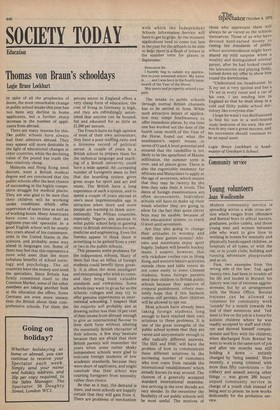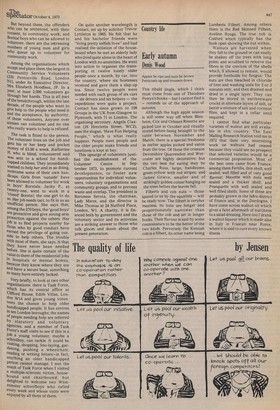Community service
Young volunteers
Joan Woollcombe
Modern community service is spreading across a wide cross-section which ranges from offenders and Borstal boys to school leavers, graduates, police cadets, and those young men and women between jobs who want to give time to working in homes for mentally and physically handicapped children, in hospitals of all types, or with the old, or in youth clubs, building and running adventure playgrounds and so on.
First, two examples from `the wrong side of the law.' Ted, aged twenty-two, had been in trouble all his life and landed in Borstal: his history was one of extreme aggressiveness; but by an arrangement with the Home Office, Borstal trainees can be allowed to volunteer for community work 'outside' for a month towards the end of their sentences and Ted went to live on the job in a home for autistic children where he was readily accepted by staff and children and showed himself compassionate and firm with the children; when discharged from Borstal he went to work in the same sort of job and after ten months was still holding it down — entirely changed by 'being needed.' More recently, a young criminal with more than fifty convictions — for robbery and assault among other things — was given 200 hours' unpaid community service in charge of a youth club instead of being sent to prison: he now works dedicatedly for the probation service. But beyond these, the offenders Who can be sentenced, with their consent, to community work, and Borstal boys who can be allowed to volunteer, there are the increasing numbers of young men and girls Who queue up to volunteer for community work.
Among the organisations which accept and place them the largest is Community Service Volunteers (239 Pentonville Road, London Ni), under its Executive Director, Mrs Elizabeth Hoodless, JP. In a Year, at least 2,000 volunteers go through her hands. This is all part of the breakthrough, within the last decade, of the people who want to give help to the people who need it and the acceptance, by authority, of these volunteers, Anyone over sixteen can volunteer and no one Who really wants to help is refused.
The task is fitted to the person. The volunteer lives on the job and gets his or her keep and pocket money of £3.50 a week. Katherine H, who is blind, volunteered and was sent to a school for handicaPPed children. They immediately wanted to help her and in so doing, overcame some of their own handicaps. Girls from 'outside' have been allowed to volunteer for work in boys' Borstals. Jacky P., at twenty-one, went to work in a closed' Borstal; the one girl to do so. Her job needs tact, to fit in as an unofficial person, She says that, among the 270 boys, the 'good boys' are protective and give strong-arm protection against the others. Her job is to find projects nearby for those who by good conduct have earned the privilege of going outside to help others. The trouble With most of them, she says, is that they have never been needed before. She is quite certain of the value to them of the residential jobs In hospitals or mental homes, because they know where they are and have a secure base, something SO many have entirely lacked.
Very briefly, to look at two other organisations: there is Task Force, Which has its central office at Clifford House, Edith Villas, London W14 and gives young volunteers the chance to help older handicapped people. It has centres in ten London boroughs; the names of people needing help are referred by statutory and voluntary agencies, and a member of Task Force's staff visits to see if this is a job a young volunteer, maybe a schoolboy, can tackle. It could be visiting, shopping, lino-laying, gardening, pushing a wheelchair, reading or writing letters—in fact, anything an older handicapped Person cannot manage. I met the result of Task Force when I visited a multiple-sclerosis victim, housebound and chairbound, but delighted to welcome two Westminster schoolboys who called every week and whose visits were enj oyed by all three of them. On quite another wavelength is Contact, set up by solicitor Trevor Lyttleton in 1965. He felt that he and his bachelor friends were "living pretty selfish lives" and had realised the isolation of the housebound when he met an elderly lady who lived quite alone in the heart of London with no amenities. He went into action to organise the transporting ot twelve lonely older people once a month, by car, into the country, where six hostesses received and gave them a slap-up tea. Since twelve people were needed with each group of six cars — six drivers and six helpers — the expeditions were quite a project. Contact has since grown to 108 Groups in the UK from Glasgow to Plymouth, with 71 in London. The organising secretary, Angela Claxton (16 Henrietta Street, WC2), uses the slogan, 'Have Fun Helping People," which is what really happens. People meet people and the older people make friends and loneliness is kept at bay.
This upsurge of volunteers justified the establishment of the
Volunteer Centre in September 1973, to promote current developments, to foster new opportunities for individual volunteers, voluntary organisations and community groups, and to prevent waste and overlap. The president is Baroness Serota, the chairman, Lady Marre, and the director is Mike Thomas at 24 Nutford Place, London, WI. A charity, it is financed both by government and the voluntary sector and its activities are a striking answer to those who talk gloom and doom about the present generation.



































 Previous page
Previous page